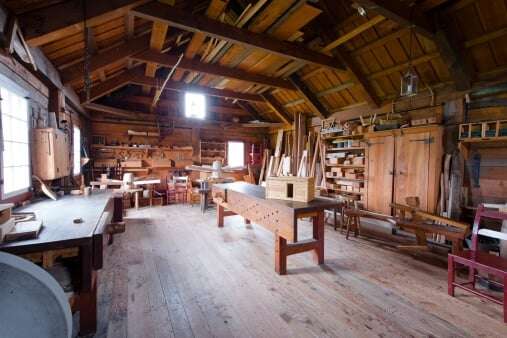 When it comes to home improvement projects, creating a workshop is one of the most enjoyable ones of all – at least if you ask your kindred spirits at Experts In Your Home.
When it comes to home improvement projects, creating a workshop is one of the most enjoyable ones of all – at least if you ask your kindred spirits at Experts In Your Home.
Whether you want to create a workshop for woodworking, arts and crafts, painting, sculpting, ceramics or sewing, you're smart to consider what's involved in adding electrical service to your haven of creativity. Our experienced, can-do team can guide you through the entire process – from the room's design to the often prudent installation of a subpanel.
Consider your workshop's functions
As a creative person already, you're likely to enjoy planning the layout of your workshop. Put first things first, though, and decide which tools your workshop must contain. Equipment often dictates position, and it certainly will drive some important electrical decisions. So decide whether you will need:
- Stationary (or freestanding) tools as well as tabletop power tools
- Artificial lighting - especially if natural light is compromised in your workshop (as is often the case in basement workshops). No matter what the purpose of your workshop, good lighting – overhead and task lighting – will be vital.
- Heating, cooling, ventilation or moisture control additions - Here, the indoor air experts at Experts In Your Home can help assess the present condition of your designated workshop space and determine whether any upgrades might be necessary. For example, a basement plagued by dampness must be remedied before using power tools. Otherwise, the risk of shock is heightened; the consequence could even be deadly. We can repair cracks in floors and walls, insulate pipes and install a dehumidifier – steps we've taken many times to make a home workshop dry and safe.
- Extra outlets – a virtual certainty. Experts In Your Home agrees with the mantra that you cannot possibly have “too many” outlets in a workshop. They probably will fill up quickly, and our licensed Chico electricians will urge you to take a “zero tolerance” attitude toward extension cords, which create safety hazards in workshops. Flush-mounted floor plugs in your workshop's central area might be another worthy addition.
- Ground-fault circuit interrupters (GFCIs) – another virtual certainty since they shut off power immediately if a short occurs.
Adding up the amps
At this point, you're probably doing some mental math and wondering if your home's electrical service can support your workshop. So check the number located on the primary breaker in your home's electrical service panel. This number will tell you the maximum amperage that all the circuits in your home can draw from at the same time.
Most houses built within the last 40 years have 100- or 200-amp service, which should be adequate to support the addition of a fully-powered workshop. (In fact, your service panel might even have unused circuits.) If your home is older and hasn't undergone any electrical updates, it might have only 60-amp service. If that's the case – or if your breakers trip frequently – you probably will need an electrical upgrade and a new panel.
Why subpanels are sensible
Rest assured that our expert electricians will check and verify all these numbers. And chances are, we will recommend that you install a subpanel to distribute electricity to your workshop. A subpanel also is an electrical panel, and it extends power from the main panel. Smaller than the main one, this mini service panel carries three primary benefits:
- It will clearly segregate your home's electrical circuits from your workshop's, making it easier for you to find and reset a breaker and shut down electrical service to your workshop, if you so choose
- It will save you significant money on wiring since it will cost much less to install one large feeder wire from your main service panel than many smaller ones
- It will minimize the drop in voltage that often occurs when wires are forced to span distances
If you're eager to get started on your workshop, you'll have an equally eager and efficient partner in Experts In Your Home.
Call us for a consultation and we'll get started – and shed some added light on how to make your workshop a safe and efficient outlet for your creative instincts.
For more maintenance tips, subscribe to our blog our download the free eBook below:







